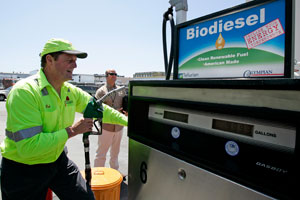Renewable Fuels Quotas for 2014 Delayed by EPA After Fight

The U.S. Environmental Protection Agency punted on setting quotas for the use of renewable fuels in 2014 and pledged to lay out next year targets for 2014-2016.
Almost a year late in setting rules for using ethanol, biodiesel and cellulosic fuels in gasoline, the EPA Nov. 21 abandoned trying to act before year end. The agency could waive the requirements for 2014 altogether or accept whatever has been produced as meeting the mandate.
“Finalization of the 2014 standards rule has been significantly delayed,” EPA said in a statement published on its website. “Due to this delay, and given ongoing consideration of the issues presented by the commenters, EPA is not in a position to finalize the 2014 RFS standards rule before the end of the year.”
Lobbyists for oil companies, who oppose the law that requires petroleum products to be displaced by other ingredients, said the EPA isn’t capable of managing the program and urged Congress to scrap the law altogether.
“This just confirms the mismanagement of this program,” Bob Greco, downstream fuel director of the American Petroleum Institute, said in an interview Nov. 21. Refiners “will go the entire year without knowing what the requirement is.”
Ethanol and oil industry advocates have battled over whether targets in the 2007 Energy Independence and Security Act are obsolete because gasoline demand has grown more slowly than forecast.
In a draft rule released a year ago, the EPA said it would require blending 15 billion to 15.52 billion gallons of renewable fuels such as corn ethanol and biodiesel in 2014, down from a requirement of 18.15 billion gallons set in the legislation. The final rule under review by the White House was forecast to slightly increase that quota, although the proposal hasn’t been made public.
Biofuel producers praised the EPA’s delay, because they said the agency acknowledged their argument that a proposal to cut quotas under the Renewable Fuel Standard would snuff out future investment in their fuels.
“We appreciate the administration’s willingness to pivot in the right direction this late in the game,” said Brooke Coleman, executive director of the Advanced Ethanol Council. “The key now for advanced biofuel investment is to move quickly to fix what needs to be fixed administratively.”
Coleman said that the practical impact of the EPA’s decision is that 2014 “is a time-out year” and predicted the agency would end up accepting what’s already been produced as the standard for this year.
“Practically speaking that’s what we had already” because the decision is so delayed, he said.
The American Fuel & Petrochemical Manufacturers, which represents companies including Exxon Mobil Corp. and Chevron Corp., said it will sue the EPA for failing to issue this year’s targets.
“Congress needs to step in and repeal or significantly reform this badly broken program,” Charles Drevna, president of the group, said in a statement. A spokesman said the suit had been planned prior to the EPA announcement and the group would go forward with the plan.
Compliance with the mandate is tracked by Renewable Identification Numbers, or RINs, certificates that are attached to each gallon of biofuel. Once blenders mix renewable fuel into gasoline, they can trade the credits.




